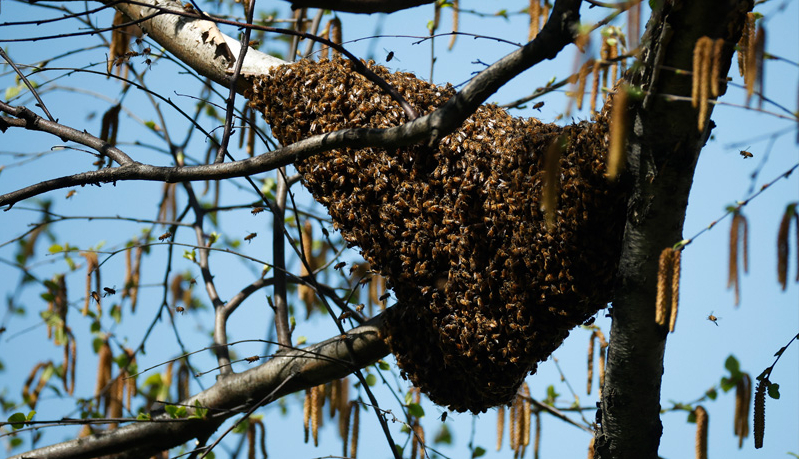
Growing up in the 21st Century has been a dance between progress and loneliness. Sure, there are perks—like technology, when used wisely. It’s connected us globally, opened doors to endless information and created new opportunities. But one of the most heartbreaking downsides is the quiet fading of community, as more people lean into self-reliance and individualism.
I’ve become fascinated by the nature of honey bees and ants.
Lately, I’ve become fascinated by the nature of honey bees and ants—creatures that would never survive in such isolated conditions.
As the last-born of four children, I was often cast as the little task maiden. I dreaded hearing my name called from some distant corner of the house. It usually meant someone had a job for me. And I remember constantly wondering, "When will this ever end?"
Now in my late 20s, I’m happy to report… it hasn’t. And no, I’m not being sarcastic. I’m genuinely grateful that it didn’t. This is why.
In mid-April (2025), my sister Esther called to tell me that our mother was in the hospital. She’d been feeling dizzy and was experiencing heart palpitations. It was around 6 pm, and I was outside bringing in the laundry. I told her I’d be at the hospital in a few minutes.
When I arrived, my mother was alone, looking sad and tired. But as soon as she saw me, her face began to brighten. I’d brought her a cup of hot chocolate and a chicken pie, guessing (correctly) that she hadn’t eaten lunch, a habit about which I’m always scolding her. Later Esther arrived, and together we dashed back and forth between hospital counters, paying for tests and getting things sorted at the lab.
My dad called, concerned. We gently asked him not to come. He’d just had a heart attack in January, and we didn’t want him driving at night. Instead, he called our Uncle Charles, who lives nearby. Uncle Charles showed up soon after and suggested we all go to his place for dinner while we waited for the test results, which would take about three hours. It was now 9 p.m.
The power of community.
At his home, something beautiful happened. The warmth of his family, the chatter and laughter, their presence—all of it wrapped around my mother like a comforter. She softened. She smiled. She became talkative again.
As I watched her walk out of that house, I realized that she came in burdened but she left lighter. That was the power of community.
It reminded me of how honey bees survive the coldest seasons: with a giant bee hug. As temperatures drop and food becomes scarce, worker bees—sterile females—gather tightly around the queen and younger bees, forming a protective cluster.
During this time, the queen stops laying eggs to conserve the hive’s limited food supply. The worker bees press closely together, vibrating their flight muscles and facing inward so the center bees can feed on the stored honey. The collective heat they generate is enough to keep the whole colony warm through winter.
God never meant for us to face life alone.
That night, I saw the human version of that. My family clustered around my mother and buzzed until she was warm again. Just like the bees, God never meant for us to face life alone.
We were created with a deep, undeniable need for connection, designed to thrive in relationships that carry us through life’s highs and lows. No matter your relationship status or where you live, your heart was made for community—real, tangible, soul-filling togetherness that reminds you that you’re seen, known, and never alone.
We all belong to each other.
Romans 12:4–5 says:
Just as our bodies have many parts and each part has a special function, so it is with Christ’s body. We are many parts of one body, and we all belong to each other.
It’s a lesson I had to learn the hard way when I moved out of my parents’ house. I was thrilled to taste independence for the first time, determined to do it all on my own. The funny thing? I didn’t even last a week. I needed my brother Roy to hammer nails into the walls and install all the light bulbs—I was too short to reach them!
And while the silence in my little place was sometimes peaceful, other times it felt like something was missing. No one was calling my name to ask for help with something. Being of service to others had become part of my core being.
Eventually, those quiet moments were filled again by calls from home asking me how to work a new gadget, plan the next family lunch, or coordinate someone’s birthday. Bible study sleepovers with my friends have become one of my favorite nights of the month. And honestly? I guess I’ve learned that sometimes, community is about showing up, and buzzing close when it matters most.
Originally published by A Rocha International. Republished with permission.
Sylvia Muia is the Communications Coordinator for A Rocha International. Based in the bustling Nairobi city, Sylvia connects A Rocha to the world through creative writing and social media posts. Sylvia is a trained journalist and has a degree in Corporate Communications and Management. Sometimes, she can be spotted knitting, painting or baking cottage pies if she is not catching up on her favorite show.
A Rocha is a global family of conservation organizations working together to live out God’s calling to care for creation ?and equip others to do likewise. A Rocha means ‘The Rock’ in Portuguese and the initiative is present in more than 20 countries around the world. They provide a missional response to the global crisis of biodiversity loss by carrying out community-based conservation projects, aiming to protect the environment through local, community-based conservation, scientific research, and environmental education.






